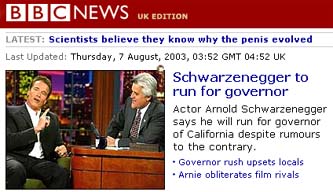
<a href="http://www.imdb.com/title/tt0107362/">Last Action Hero movie poster/IMDB</a>
Shortly before California’s 2003 special election for governor, the Los Angeles Times reported that a number of women had accused Arnold Schwarzenegger of groping and various other sexual advances. Arnold vaguely fessed up to some bad behavior in the past, but said, “I don’t remember things that I’ve done or said 20 years ago. I don’t remember things that I’ve done 30 years ago.” The Times series was widely viewed as a thinly veiled hit piece scheduled to run just days before the election in order to ruin Schwarzenegger’s chances.
That was never true. The reason the stories ran so late is because the special election was only six weeks long. If it had been any ordinary election, the Times would have spent far more time on its reporting and the story would likely have broken months before election day. In the event, though, the accusations were out there and the Times did  heroic work putting together a hugely complex story under tight deadline pressure. As far as I know, the accuracy of their reporting hasn’t been seriously challenged to this day.
heroic work putting together a hugely complex story under tight deadline pressure. As far as I know, the accuracy of their reporting hasn’t been seriously challenged to this day.
And what about Arnold? He insisted that this stuff was so far in the dim past that he could barely remember it. But it wasn’t. Today we learn that he had cheated on his wife and had a child out of wedlock just a few years before. His megawatt-smile denials were pure pap, and if knowledge of his affair had been public it’s almost a dead certainty that the recall would have failed and Gray Davis would have remained governor. The car tax would have stayed in place, no bonds would have been issued to make up for it, and California’s deficit problems would have been less than half as bad as they turned out to be under Schwarzenegger.
That’s what comes of running a politically motivated snap election with weird rules in six weeks: you don’t really know what you’re getting. In the end, the Times was right about Schwarzenegger, and his folksy boys-will-be-boys denials were lies. We’ve paid a pretty high price for that.


















